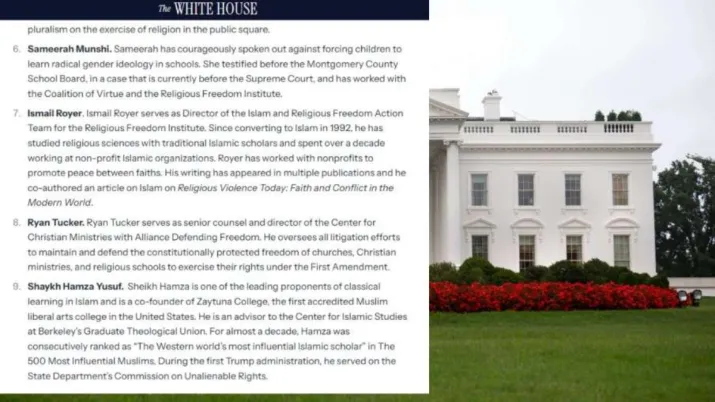The appointment of two jihadis in the White House Advisory Board has raised questions on America’s intention to fight terrorism. One of these terrorists has direct links with Lashkar-e-Taiba, which has been involved in terrorist attacks in Kashmir.
Two former jihadist operatives from the United States, one with alleged ties to the Lashkar-e-Taiba (LeT) terror group in Pakistan and participated in attacks in Kashmir, have been appointed to the White House Advisory Board of Lay Leaders under President Donald Trump’s administration.
The inclusion of two individuals with alleged terrorist ties in the administration has sparked global outrage. They have been appointed to the White House’s Lay Leaders Advisory Board. Details about the appointments of both individuals have been published on the official White House website.
Trump recently announced the formation of a new panel, the Lay Leaders Advisory Board, which is tasked with advising on issues related to religious freedom and faith-based policies. Among the appointed members are two Muslim individuals described as scholars, though one of whom has direct links with terrorist organisations like Lashkar-e-Taiba (LeT), while the appointment of the other has also drawn criticism and raised concerns.
Two controversial names in Lay Leaders Advisory Board
Ismail Royer
Ismail Royer is currently an American citizen. He was notorious for involving Muslim youth in extremist activities in the late 1990s and early 2000s. In 2000, he traveled to Pakistan and reportedly underwent training at a Lashkar-e-Taiba (LeT) terror camp. During that period, he was also allegedly involved in attacks on Indian Army installations in Kashmir.
In 2003, Royer was convicted in the United States on terrorism-related charges and sentenced to 20 years in prison. He served around 13 years before being released. Since his release, Royer has claimed to have reformed. He currently serves as a director at the Center for Islam and Religious Freedom, where he says he is committed to fostering religious tolerance, promoting reform, and encouraging dialogue within the Muslim community.

Shaykh Hamza Yusuf
Hamza Yusuf is regarded as one of America’s prominent Islamic scholars and is the co-founder of Zaytuna College in California, the first accredited Islamic liberal arts college in the United States.
While he is often portrayed as a liberal Muslim thinker by the American establishment, some of his past statements, particularly those criticizing US foreign policy or addressing Islamic fundamentalism, have sparked controversy. Due to these remarks, he has occasionally been viewed as having sympathies toward jihadist ideologies, making him a contentious figure in public discourse.
What US have to say on this?
Lashkar-e-Taiba is believed to be behind several major terrorist attacks in India, including the 2001 Indian Parliament attack and the 2008 Mumbai attacks. In light of this, many Indian security analysts and foreign policy experts have called the Trump administration’s appointments “diplomatically insensitive.”
The move has also drawn strong criticism from the US national security community and Trump’s political opponents. Critics argue that granting former jihadists a role in a White House-level advisory committee could pose serious risks to national security.
Amid the backlash, the Trump campaign issued a statement defending the decision, saying that the Lay Leaders Advisory Board was created to “strengthen religious freedom” and promote “dialogue between communities”. It emphasised that the inclusion of individuals like Ismail Royer and Hamza Yusuf is meant to highlight that “rehabilitation and transformation are possible,” and that people with troubled pasts can still contribute positively to society.
However, this controversy has sparked a much larger debate that goes beyond US politics. It raises global questions about whether individuals with terrorist ties can truly break free from their past and take on public roles responsibly. Can rehabilitation efforts serve the public good, or do they risk legitimizing past radicalism? While the Trump administration frames its stance as one of “forgiveness and reform,” critics argue that there’s a stark difference between its rhetoric and its actions on counter-terrorism.
(Input from White House website and agencies)
Also Read: Pakistan imitates India again: Islamabad to send its ‘peace’ delegation on global stage
Also Read: India puts restrictions on entry of Bangladeshi products from several northeast ports


